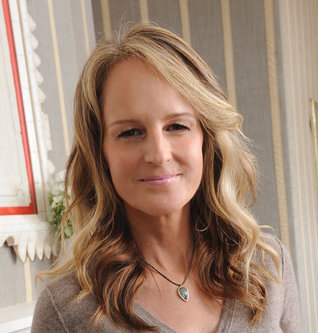Cari Lynn is an AwardsLine contributor. This article appeared in the Dec. 5 issue of AwardsLine.
Academy Award winner Helen Hunt might have another shot at Oscar in what’s certainly her most “revealing” role to date—playing the real-life sex surrogate Cheryl Cohen-Greene hired by quadriplegic Mark O’Brien (John Hawkes) in the Sundance darling, The Sessions. Hunt discusses playing a real person, self-acceptance, and what it’s like to be that naked.
AWARDSLINE: I’m taking a stab here that prior to this script you hadn’t ever heard of sex surrogacy?
HELEN HUNT: No, I knew nothing about it. I thought there couldn’t be much difference between prostitution and that, no matter how you dress it up. But then I spoke to the real Cheryl—which, often, as an actress, isn’t as helpful as people would think because when you’re using your own imagination and experiences to build a character, speaking to the real person can be disorienting. But in this case, I didn’t have any idea, and I needed to get one really quickly. The real Cheryl is louder, more frank, and has a more enthusiastic quality than I have. So I got excited about the idea of at least starting like that and with a certain amount of bluster walking into the room: This is what it is to be naked, this is what it is to talk about parts of the body, and let (John Hawkes, playing Mark O’Brien) catch up a little bit. I also thought this would allow me to put something different in the end when Cheryl’s feelings for him deepen and her sense of intimacy grows. It was important that we not see this woman only one way all the way through.
AWARDSLINE: The clothes do come off pretty quickly and unceremoniously.
HUNT: Whenever I see anyone naked in a movie it takes me a minute, and we wanted to just get that out of the way. But also, I think the audience is in John’s head, and the fact that it’s all happening faster than he can quite manage is funny and scary, which are the two things I think it’s meant to be at that moment.
AWARDSLINE: A theme of The Sessions is knowing your body and figuring out how to be comfortable in it. Did that ring true for you personally or was it still quite difficult to approach those full nude scenes?
HUNT: That’s as naked as I know how to be. I was not as comfortable as (Cheryl) was, but I must be more comfortable than a lot of people because I did it. The whole north star for me was loving the story; I didn’t do it for the thrill or the dare of being naked. And what came along is the feeling of, Who cares anymore? Maybe it comes with being older—are we going to care about things we don’t even believe in, like everyone should look a certain way or everybody should be a certain age, or we should all be filled with shame and hiding our bodies and sexuality? Or are we going to take an opportunity of at least trying to be in the skin of someone who isn’t playing that game? By the way, the real Cheryl told me that she wasn’t always so comfortable with her body. There’s working on yourself from the inside out, which I think I did when I was younger, and as I get older I work on myself from the outside in, and by that I mean that if you don’t feel it, act “as if,” and the feelings might catch up, and this a perfect example of that. This is the way I want to be, and what a beautiful piece of good fortune that I was given a part to play around with what it would be like to feel that way.
AWARDSLINE: This film is about acceptance on several fronts, from sexuality to disability.
HUNT: The disability in the movie does something very particular in that it deconstructs the sex by necessity, and so it makes it like the sex that all of us have, improvised and ridiculous and beautiful and awkward and scary, and not so much like all the choreographed weaving that we see in movies and that I’ve done in movies.
AWARDSLINE: How did the real Cheryl respond to the film?
HUNT: She wrote me a card that said, “Thank you for really understanding my intentions in terms of my time with Mark.” I think that’s what probably meant the most to her.
AWARDSLINE: I saw you earlier this year in the play Our Town. What makes you want to take a film role these days? What has to be there?
HUNT: A good script, a good script, a good script…or money. I had a very fancy moment in 1997 or whenever it was that I had a lot of good fortune at once. And then I did Castaway, and people were like, “You’re in it for 15 minutes. What are you doing?” But the story—it was a great story! I like getting to be part of telling a story that works, and (The Sessions) was a totally original, totally beautiful story.

